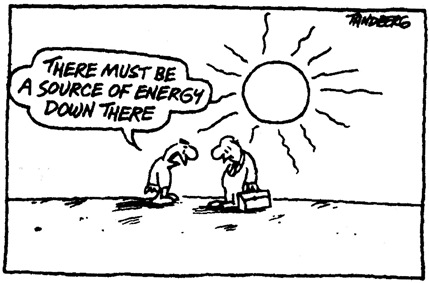« Prev Next »
Why is geology important for us?
Uniformitarianism is a concept stating
that the same laws that govern our universe today have always been that way
through time. It was a concept coined by William Whewell, who died later from
falling by a horse; an event not often preserved in the past geological record,
ironically. What this concept tells us, though, is that to understand processes
and patterns that are happening now and into the future, we need to read back
in time to uncover how these shaped the world we live in. This is the
importance of geology: the past is not the key to just the present, but also to
our futures. And this is not the only reason why it’s significant - geology
plays a much bigger role in your lives than you might initially think!
All your stuff!
So geology, it’s just the study of rocks, right? Wrong. While it does involve consulting our rocky friends from time to time, it’s so much more than this: geology is the study of the Earth, it’s materials and the processes that shape it and have historically shaped it. There’s about a 100% chance that you’re reading this on a computer of some kind: where do you think the materials that make laptops, mobile phones, computer processers and all the other fiddly bits come from? Plastics are synthetic forms of hydrocarbons or petrochemicals, which come from deep in the Earth and form over millions of years. The metals that make up the rest of your machines come from the rocks in the Earth. Known as ores, rocks containing metals have to be treated in different ways to release their industrial bounties. Some are extremely rare, and require detailed prospecting by geologists to locate.
 So that’s one example: computers
run many aspects of our daily lives, and would not be possible without
geologists to track down and source the original materials that make them. The
same applies to almost anything: your houses, your toys and other equipment,
your streets, the buildings you work in and the tools to make them - all require
geologically sourced materials to be built in the first place.
So that’s one example: computers
run many aspects of our daily lives, and would not be possible without
geologists to track down and source the original materials that make them. The
same applies to almost anything: your houses, your toys and other equipment,
your streets, the buildings you work in and the tools to make them - all require
geologically sourced materials to be built in the first place.
Other precious items, such as
your jewellery, the tin foil your favourite sandwich comes in, that pan you
brought your boyfriend recently so he gets the hint, all have their initial origins
deep within our Earth. Geologists find them, and others craft them into the
items we use in our every day lives. If you look around your room right now, or
the bus, train, street you’re on, look and see how much of what you see has its
origins under ground.
Energy
We have an unimaginably powerful,
limitless energy source (not red bull): the sun. The sun is a thermo-nuclear
reactor in supreme command of energy distribution in our little solar system.
However, humans are only beginning to understand how to harness its vast energy
to power our little planet (e.g., through solar panels). Like much renewable
energy sources, they are only beginning to be developed on larger scales to
actually be of more commercial use. For now, much of the energy we get that keeps
our cities running, our trains occasionally on time, and our bed lamps lit
comes from underground, from the rocks.
Fossil fuels form over millions of years from decaying organic matter, and once used, can never be brought back. These non-renewable energy sources, like gas and oil, are dominantly responsible for the pattern of disruptive climates we see on a global scale at the present, due to the release of carbon dioxide gas into the atmosphere. Geologists are key players in helping to locate and extract these resources. Not only this, they also hold one of the keys to stopping the environmental impacts of fossil fuel usage: carbon capture and storage (CCS). CCS is a way of storing carbon dioxide gas from the atmosphere, and could help slow and even reverse the impacts of global climate change. Geologists, again, will be at the forefront of the ‘storage’ part of this, as rocks are prime targets for storing huge volumes of carbon.
 Nuclear energy, that formed from
radioactive decay of elements like uranium, also is sourced from the rocks.
Nuclear energy is considered unsafe by many, due to events like that recently
in Fukushima,
but could actually be the cheapest, safest, and most efficient way of powering
humanity in the future. Geologists play a further role in helping industries
understand how to manage the
radioactive waste from nuclear energy in the safest possible way.
Nuclear energy, that formed from
radioactive decay of elements like uranium, also is sourced from the rocks.
Nuclear energy is considered unsafe by many, due to events like that recently
in Fukushima,
but could actually be the cheapest, safest, and most efficient way of powering
humanity in the future. Geologists play a further role in helping industries
understand how to manage the
radioactive waste from nuclear energy in the safest possible way.
Another item of concern, which is
half hazard half resources, is the issue of water. Too many people living on
this planet have difficulty accessing clean water. Geologists are experts at
tracking underground water pools, known as aquifers, and making sure this water
can be introduced to needy communities in a self-sustaining manner. With an
ever-growing global population, water resourcing will become an increasingly
bigger issue, and geologists who can track it down will certainly be in high
demand. The quality of this
water is also something which geologists play a big part in.
Geologists have multiple roles
with energy: firstly, to locate it, secondly to figure out how to extract the
resources in the most efficient and cost-effective way, and thirdly so that
using them has the least social or environmental impact.
Hazards
Tsunamis, volcanoes, landslides, floods, earthquakes - nearly every day we hear of a new tragedy afflicting our planet. Each one of these natural hazards has a geological component that geologists play a role in trying to manage. Tsunamis are triggered by underwater earthquakes displacing often massive amounts of rock, and can be anticipated due to the waves they produce being detected by global monitoring systems. Understanding the way in which these seismic waves move through the Earth can provide coastal communities with the vital moments they need to evade or prepare for a tidal wave. Volcanoes have cues that geologists can read that tell us when the volcano is near to erupting on to the surface. By looking at the geological structure of volcanoes, many lives can be saved by pre-empting eruptions, at least until we figure out a way to stop them erupting! (giant ice cubes anyone?)
 Areas prone to landslides can be monitored
using sophisticated equipment that can detect which areas of a rock face or
hillside are most sensitive to slipping away, and prepare or warn local
communities appropriately. Earthquakes are tough.
It’s very difficult to predict exactly when they will occur, but we can give a
pretty good guess of where they will. The majority of earthquakes happen along
fault lines, often along plate boundaries. The pattern of earthquakes we see
corresponds to how active these plate margins are, and can identify danger
zones for local communities. They can also provide advice on how to build near
earthquake-prone zones, by making sure buildings are structured in the right
way to resist seismic waves.
Areas prone to landslides can be monitored
using sophisticated equipment that can detect which areas of a rock face or
hillside are most sensitive to slipping away, and prepare or warn local
communities appropriately. Earthquakes are tough.
It’s very difficult to predict exactly when they will occur, but we can give a
pretty good guess of where they will. The majority of earthquakes happen along
fault lines, often along plate boundaries. The pattern of earthquakes we see
corresponds to how active these plate margins are, and can identify danger
zones for local communities. They can also provide advice on how to build near
earthquake-prone zones, by making sure buildings are structured in the right
way to resist seismic waves.
So geologists have a huge role to
play, not in making these disasters not happen, but in making sure that people
are sufficiently warned, prepared and informed about the potential risks of
living there.. Next time you hear of a flood or other natural disaster, ask
yourself whether there were enough geologists involved to help mitigate the
problem, or what the geological aspects of it where that could have been
prepared for more (e.g., strengthening river banks).
Life
The history of life is encoded in the rocks, and decoding them reveals the wonder-filled story of the co-evolution of life on this planet. Life, the biodiversity of organisms on this planet, is currently under threat of a magnitude rarely seen before. Humans are harming environments and species in numerous ways, and we have a conservation crisis looming. However, how do we know how animals will respond to future changes? Hindsight is the key to forecasting. This is one of the roles the fossil record can play, by telling us the tale of how organisms respond to climate change, for example. Fossils such as coccoliths also can tell us about what past climates were like, so play a two-pronged part in trying to understand how species will respond in the future as our world changes.
 No big deal then
No big deal then
So there you have it. You
probably won’t hear about it in the media or on the streets as much as the
latest in genetics, medicine, or Boris Johnson’s hair, but geology affects how
we live our lives, every single day. This is just a taster of what geology
really is too - we didn’t even touch on aspects such as planetary formation, or
actually understanding how our planet works. If you want to learn more about
geology and get involved,
there are communities of amateur and professional geologists in almost every
town or city in the UK, and probably many more globally too - all you have to
do is hunt them down! (Geologists can usually be found attached to rocks or
pint glasses). The great thing about geology is that anyone can get involved -
the outdoors is out natural laboratory, it all takes is a sense of inquisition
and a love of our natural world!
Written by Jon Tennant, edited by
Jane Robb
Note: Many of the links in this article lead to the Geological Society
of London - they are an active professional learned society promoting geology
in the UK, and you can get involved in many ways. They also hold details of all
the local chapters, so do get in touch with them!
Additional reading: This,
by Dana Hunter























